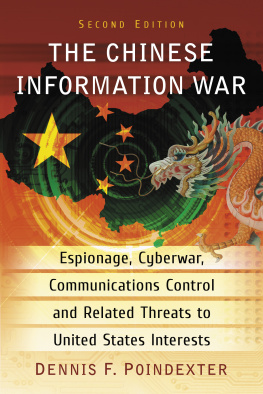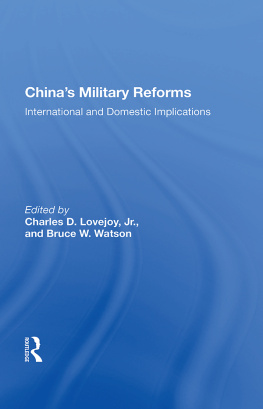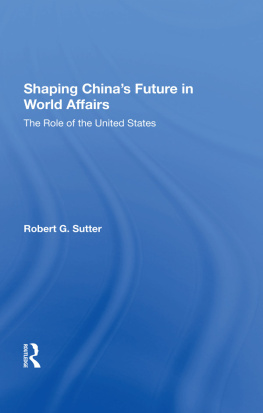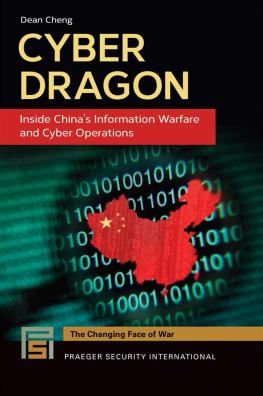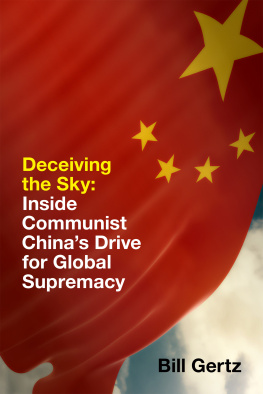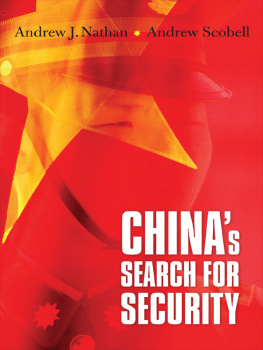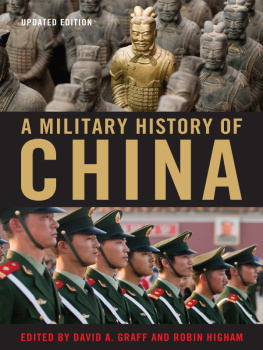
Also by Dennis F. Poindexter
The New Cyberwar: Technology and the Redefinition of Warfare (McFarland, 2015)
The Chinese Information War
Espionage, Cyberwar, Communications Control and Related Threats to United States Interests
SECOND EDITION
Dennis F. Poindexter

McFarland & Company, Inc., Publishers
Jefferson, North Carolina
LIBRARY OF CONGRESS CATALOGUING DATA ARE AVAILABLE
BRITISH LIBRARY CATALOGUING DATA ARE AVAILABLE
e-ISBN: 978-1-4766-3176-9
2018 Dennis F. Poindexter. All rights reserved
No part of this book may be reproduced or transmitted in any form or by any means, electronic or mechanical, including photocopying or recording, or by any information storage and retrieval system, without permission in writing from the publisher.
Front cover images 2018 iStockphoto
McFarland & Company, Inc., Publishers
Box 611, Jefferson, North Carolina 28640
www.mcfarlandpub.com
Preface
This book is about a war that many will doubt we are in: an information war with China. To understand this is to believe that we do not have war anymore, at least in the traditional sense of it. The new type of war is Chinas bending a countrys will to its own. It is clever, broadly applied, successful, and aimed directly at the United States.
The 1990s were the years of information warfare, at least judging by the two-inch-thick treatise Information Warfare: Legal, Regulatory and Organizational Considerations for Assurance, published by the Joint Staff of the Pentagon in 1996; but it was being talked about long before it became fashionable. The Chinese were following the strategies before that, but they may have been encouraged by our concentration on it. They have applied themselves to it and have done well.
This war is neither conventional nor accidental. The U.S. military expanded the doctrine and made it public, but they seldom used it themselves. Our military is at a disadvantage in its application because it is part of a system of government that is democratic and decentralized, and that separates the government from commercial business. This is a system that has served us well, but it is not one that China sees as a path to the top of the worlds food chain.
This is not a how to book of strategies that might be developed to fight a war. It is a way to organize what the Chinese are already doing, to make sense of it. Until we see ourselves as being in a war, we cannot begin to fight it effectively. It doesnt fit our idea of war because the Chinese have changed the nature of war to carry it out. The First Principle of War is never to be at war with anyone. This is the Escher drawing of wara stairway that never goes where it should. They will never admit that what they are doing could be interpreted as war. Denial is a large part of this form of war.
We tend to think of war as something fought by the military, when we know the militaries of the world are often augmented by other types of covert actions, usually carried out by the intelligence communities of different countries. We know that a military attack force can have ground troops who are not in uniform and not working for a military commander. There are helicopters overhead that are different from some of the others and are not manned by pilots working for a military. There are support functions that give maps and warnings to attacking military forces. Some of the forces operate from front companies that look like legitimate businesses but are really covered operations. The Chinese use their companies as covers for their government and military, but they are not the only country that operates them. If we dont see them for what they are, they are doing their operational security the way it is supposed to be done. Information war should be below the enemys radar.
The gap that this book covers is an area of information warfare that is called black and involves classified national security information, which is not supposed to be written about in the public media. The irony, of course, is that people do actually write about things that are black, and the government even approves some of the things that are said. We talk about things we do in war, yet we hold these things to be among our most valued secrets.
In this book Ive done the best I can to describe some of the aspects of this type of warfare without discussing things that could be related to United States military or intelligence community capabilities. Sometimes that means being vague about what the U.S. might be able to do, or how an enemy might be able to develop other capabilities. Where possible, I have used open sources and what hackers are doing, even though those groups may not be sponsored by a government agency.
Hackers have caught up to what the governments were doing ten years ago, and the concern today is that terrorists will do the same. It is probably inevitable that this will happen, and when it does, there will be almost no deterrent that can stop a stateless group from causing us damage that will be painful. I have tried not to encourage them or point them in any particular direction. Too many people speculate on how to hurt us, without thinking about how that might benefit someone who hasnt thought about the subject very much.
I wrote this book for a general audience and not just for military people. The military does not pay much attention to doctrine unless it helps them win wars. This is not a war that the military would fight alone. My purpose is to educate by attempting to teach concepts, not techniques, of warfare. If my audience believes we might already be at war with China, the book is a success.
There are several congressional reports that are very authoritative and well written, and, for the most part, I have used these as sources. They are the only unclassified sources for some of this material. The U.S.China Economic and Security Review Commission has provided the best sources of any committee of Congress and has done so more frequently than most others. They are both authoritative and thorough.
I have said what I think China has been doing, and in this edition included a few things about Russia, North Korea, and Iran without mentioning some of the U.S. capabilities to counterattack. Some of my critics think China is weak and does much of their information war out of fear of the rest of the world. I doubt that. They could not take on countries like the United States if they believed they were too weak to do so. Their strategy is to wait for a time when the advantage is theirs. At the same time, they know their own strength.
I believe the Russians and Chinese work together more than we currently know, in information warfare. Their techniques and strategies are too much alike for it to be coincidental.
We are behind the Chinese in areas that are going to cause us great harm if we dont start catching up. But it is not something you will hear discussed in the halls of Congress or the Pentagon. Exactly how we are behind is one of our best kept secrets and will stay that way. We have to learn to fight in similar ways, and we have to do it quietly.
This book could not have been written without the support and inspiration of my wife, Virginia. She is very smart and keeps good counsel.
1
No Wars Here
Next page
